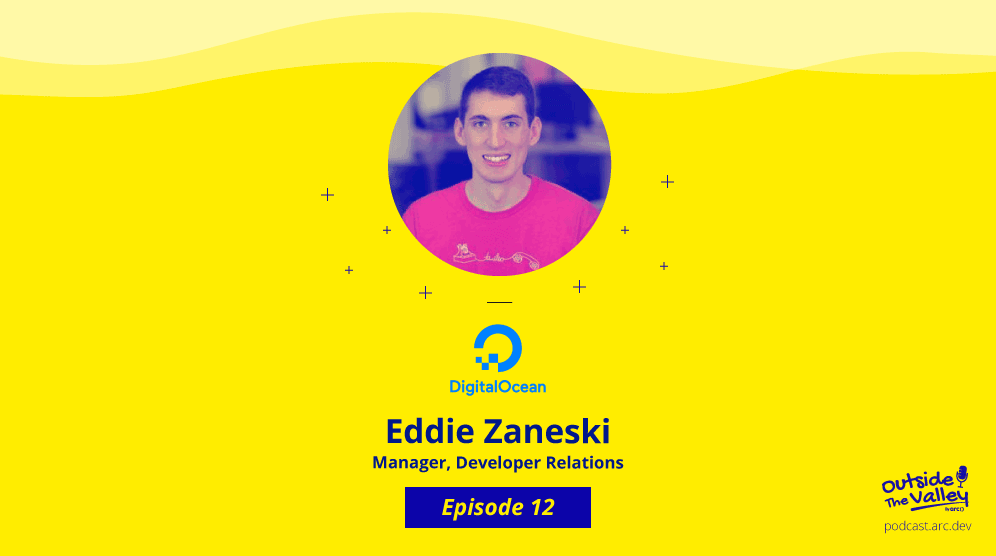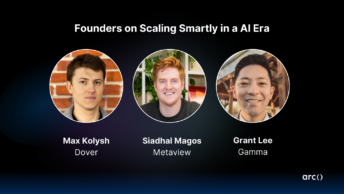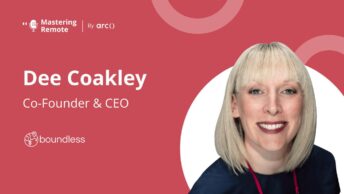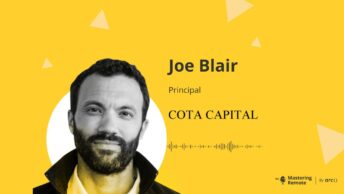So, if you have, you know, companies based in California or Colorado, if you only have onsite people, those are really the only communities that you can work on and build. Sure, you can send people on flights around the world and go to other places, but it’s easier to just embed someone in a local community and have them foster that local community, right?
This week we are joined by Eddie Zaneski, Manager of Developer Relations at DigitalOcean!
This episode is quite special, because we’re focusing on one single job position, which is, you guessed it: Developer Relations.
We talk about how Developer Relations is a position that only makes sense when it’s a remote position, and how the rise of remote work affects this particular position. We also talk about The Remote Developer Experience report released by DigitalOcean this year, and the life of remote workers at DigitalOcean.
If you’re enjoying the podcast, please consider leaving a review on iTunes!
The podcast is also available on your favourite players: iTunes, Google Podcast, Castro, Overcast, Spotify, Stitcher, Player.fm, and Tune In.
Follow us on Twitter to get updates.
Looking for top talent fast? See how Arc can help you:
⚡️ Find developers, designers, marketers, and more
⚡️ Freelance or full-time remote + fully vetted
⚡️ Save up to 80% with global hires
Hire top talent with Arc risk-free →
Topics also covered on the podcast episode:
- 03:31 — What makes DigitalOcean’s hybrid team model successful
- 06:42 — Examples of the “remote-first mindset” at DigitalOcean
- 08:03 — Early resource investments by DigitalOcean to make remote work run smoothly
- 09:16 — The growing pains of DigitalOcean’s remote processes
- 13:49 — Eddie’s most surprising finding in the DigitalOcean Remote Developer Experience Report
- 21:26 — How the rise of remote work helps foster communities of local developers
- 34:29 — Advice for developers who wants to start their own meetup
Mentioned Resources
- DigitalOcean
- IRC
- Currents: The Remote Developer Experience
- SendGrid
- Twilio
- THAT Conference
- Zoom
- Owl Labs
- Tulsa Remote
- Eddie’s Twitter
- Eddie’s GitHub
Full Transcript:
Jovian: Hello, world. Welcome to another episode of “Outside The Valley.” The podcast where we interview remote startup leaders, remote work advocates, and CEOs of distributed teams who thrive outside of Silicon Valley. They share insight on what works and what doesn’t so you can learn to do it right. “Outside The Valley” is brought to you by Arc, the remote hiring platform that helps you to hire remote software engineers and teams easily.
I’m your host, Jovian Gautama. On this week’s episode, we are joined by Eddie Zaneski, Manager of Developer Relations at DigitalOcean. This episode is quite special because we are focusing on one single job position, which is, you know, you guessed it, developer relations. And we also talk about how it was the OG remote work role. We also talk about how the rise of remote work affects this particular position and dive a bit into the remote developer experience report that was released by DigitalOcean July this year.
We also touch a bit on life for remote workers inside DigitalOcean. So we are on our 12th episode now and if you somehow like the show, I’ll totally appreciate it if you can go to iTunes and leave us a review. If you have any feedback, good or bad, feel free to hit me up via email at jovian@arc.dev. J-O-V-I-A-N@A-R-C.D-E-V. Now, without further ado, here is Eddie Zaneski from DigitalOcean. Here we go.
Hello, everyone. Welcome to the show. Today we have Eddie Zaneski from DigitalOcean. Eddie is the Manager of Developer Relations and now based in Denver, Colorado. Eddie, welcome to the show.
Eddie: Hey, thanks for having me, Jovian.
Jovian: Awesome. So, Eddie, I mean, to kick off everything, can you share a bit more about yourself and your position in DO?
Eddie: Yeah. So like you said, I serve the developer community at DigitalOcean, basically either online, in-person, you know, kind of wherever developers are already gathering, that’s where my team will focus our efforts. So bringing people closer to DO and strengthening the relationships, even just helping people out in the broader developer community, that’s our goal.
Jovian: Got it. So let’s start with DigitalOcean as the company first, how many people is there now in the DigitalOcean?
Eddie: So, as of probably two months ago, we put out a blog post that said we are 500 people. We’re probably right around that, maybe a little, like 530-ish. I don’t know, I don’t have an exact number, but we’re between 500 and 600 right now.
Jovian: Cool. So, an interesting thing about DigitalOcean is that you guys are hybrid company, hybrid as in a lot of them, all of the team members are co-located and a lot of team members are remote, you know, fully-remote or half remote. And, as far as I know, if you go out there trying to do some more research about the best practices for startups and remote teams, the sentiment is that either you go 100% remote or everyone is co-located, but, you know, DigitalOcean with around 500 something employees, you guys manage to pull it off.
Can you share a bit more, first of all, like what do you think makes it successful? Like is there any like secret sauce or special workflow that you guys managed to implement in your organization?
Eddie: So DO is over half remote, I think we’re right around 55% or 60% remote. So most of the company is remote and then we think it’s around 80% of engineering is remote. So most our engineering team is scattered around the world. As for secret sauce, it’s very ingrained into our culture. Like early on, DO hired CIS admins that were remote to be our early support team, right? And I think that’s what really paid off in the beginning was, you know, find these great people who are CIS admins who knew Linux really well and bringing them on to do support tickets and run support.
You know, we had initial our community team, that’s our technical writing team at DO, a large chunk of that was remote early on too. And most people know DO through those tutorials. So I would say that DO went, you know, all in on remote pretty early on, finding some great talent throughout the U.S. And then, like I said, it’s really ingrained into our culture.
So the best example I have of this is, when I was interviewing for DO back at the end of 2017 and I was talking to the, can’t remember the title, I think it was the director of employee experience and she was saying that for Pi Day, right? So Pi Day, March 14th, you know, it’s a common trope to give out pies and have pies for everyone in the office.
And so, you know, she said, before they even worried about, so our headquarters is in New York City, and so she said before they even worried about where they were gonna get pies for the office, they were figuring out how are we gonna ship all of these remote employees a pie so they feel included? Right?
So it’s that like remote-first mindset. Like, how are we gonna do this? Is it gonna work for remote-first?
She’s like, “You know, I can figure out where to get pies from in New York City.” right? That’s not a problem, the problem is gonna be figuring out how to get them delivered in mail to everyone else on Pi Day. And so I think that’s a great example of like, it’s really just built into how do we scale this for remote people first?
Jovian: The remote-first mindset is actually something that you always have to implement very early on. I mean, especially when you’re co-located, basically you have to treat everyone as if they’re remote. For example, some practices that we and Arc do actually we have some remote team members, right? So whenever we have meetings, even though for example like two team members are remote and we have like five of our team members is in a meeting room, we will all use our Zoom video so everyone just feel included, if that makes sense. Because it’s really easy to feel isolated, especially when everyone is on the same place, the nuance just doesn’t transfer over.
Eddie: And so that’s actually very common at DO where you’ll see one person sitting on a hangout in a big conference room in the office and everyone else on the call is remote. I think the marketing team is kind of the opposite of that. So DevRel sits under the marketing team. Marketing is mostly either in New York or we have another smaller office up in Cambridge, Massachusetts. And so outside of marketing, most of the company takes, you know, lots of remote calls.
Jovian: Got it, got it. So other than the whole remote-first mindset, is there any specific programs perks or policies that you think is that most special thing about DigitalOcean that makes them, that makes them the best place for remote workers?
Eddie: Yes. So DO invested heavily into IRC early on, right? But this is before Slack even existed, right? So DO, they were big onto IRC, they built a lot of tooling around IRC, some bots. It was really how the company stayed connected, you know. And thankfully Slack came out, made things a lot better, though some people would argue IRC was, you know, better in many ways and the move to Slack was, you know, pushed back against quite a few times.
So now DO is all in on Slack, you know, we have tons of tooling built for it which is I think is pretty unique. I’ve worked at a bunch of other companies before that used Slack but DO is really in on Slack, like tons of custom tooling, tons of bots, tons of different channels and it works out really well.
Jovian: What were the challenges that DigitalOcean’s faced when they’re scaling remotely? Not only remotely actually, because when the Qalqilya team also scaled which means they also need to learn how to communicate with remote team members. Is there any particular specific challenges that you remember was you were like, “Oh, this is quite painful, or this is a growing pain?”
Eddie: So I think a lot of people that work for DO as remote, this might be their first remote job, right? So kind of like figuring out the onboarding for remote, that was definitely very bumpy at first. And then we have a very great remote onboarding procedure now, right? So we’ve overcome that challenge. We have a big remoties channel on Slack where all the remote people hang out and say…
Jovian: That’s interesting.
Eddie: They all say good morning to each other.
And so, you know, every week we do “the thing” where the person running the onboarding will invite the new people to the remotie channel. And every single remotie will welcome them with, you know, a bunch of gifs or emojis or it’s kinda just like a huge train of like welcome. So it makes everyone feel really special and pretty great.
So, yeah. So a specific remote onboarding, like how do we onboard remotely or something. Sometimes it’s worth flying people to New York to a remote onboard.
Actually, a lot of the time I hear people like, they were interviewing for a remote team and we like to bring people into the office at some point during the interview process just so they can see the office, the culture, the environment. But, you know, we’ve had people that we’ve flown in for interviews that they spend the whole day in a conference room by themselves on hangout calls, right? Because their team is remote and they’re interviewing remotely.
So, you know, we give the option now. So you can either fly in and like, you know, do some of the Hangouts here and meet people, or you can just do the entire interview process remotely at home.
You know, that was a thing to figuring out just having people alone in a conference room and I don’t mean alone, but you know what I mean, like other interviews are basically on a hangout that they could have done at home anyway. You know, things like that are still bumpy, it’s like I said, really maintaining that culture is what we’re focused on now, that’s our biggest challenge.
Jovian: Right. I think that makes sense especially, again, I’m on the opinion that hybrid team is harder, you know, to maintain even though you have these all remote-first mindset. But again, you know, sometimes people are still, you know, talk to these people beside them and they get inside jokes and whatnot but it looks like you guys are handling it very well. I want to talk a bit more about, so, DigitalOcean itself has been a somewhat remote company for a while now even before remote thing was really a thing.
And this year you guys published a new remote work report by a Currents, which is a fantastic name, by the way, Currents and DigitalOcean, I always think that this is very cool. And so in this report, we in Codementor also helped to spread the survey to our community. Can you share a bit more about why do you guys decide to focus on remote work for this year’s Currents report?
Eddie: So, Angela, a big shout out to her, she’s the one who drives all the Current’s stuff internally. We like to look for just trends in the developer community, right? So maybe emerging trends, maybe current trends. You know, and with DO being primarily remote right now, a lot of developers are super interested in remote work. So, you know, naturally, we just gravitated towards this trend, really wanted to just, you know, gauge the info and share it back to the community, that’s one of the big things, hold the community and make sure we share all the data back and the takeaways. So, you know, that’s why we do Currents.
Why we focused on remote work is, like you said, more people are interested in being remote than before, you know, people are leaving big cities, right? I think you see headlines every couple of weeks about like, people are leaving San Francisco, people are leaving New York. I’m a perfect example, you know, I left New York less than a year ago.
Jovian: After you read the finding of the remote work report, is there any particular findings that you find quite surprising?
Eddie: One of the big one is, well, most people are interested in remote work, right? So that was the hypothesis going in, it’s like more and more people are getting interested. I think one of the bigger takeaways though was there was a question in here about burnout and how you feel about burnout and like does being remote make you any less stressful? And it actually wasn’t that significant, the difference between people who felt burnt out in-office versus people who felt burnt down out-of-office, it was very, very close.
So, you know, being remote, sure it helps with your quality of life and it helps with a lot of other stuff, but when it comes to work and stress and burnout, it’s doesn’t change much, tech just seems stressful in general.
Jovian: So it feel like just given the option for an employee to be remote is actually not enough. So for example, there’s a company saying that, “Yes, we have like two remote days per week, or you can work remotely like four days per month.” Or probably they just get, “Okay, this is a remote company, just do whatever you want.” So it seems that just giving freedom is not enough, is that makes sense? So in a way the freedom also has to be, I mean, the company has to support more on the freedom itself, is that correct?
Eddie: Yes, that’s a fair statement.
Jovian: And our findings here is that, I want to talk more about the need for a community for remote workers, right? A lot of developers, a lot of employees when they’re working remote, with their free time, of course, they try to find more communities working with opensource or go to meetups. And how about you? Is this also one of your personal experience, so to speak, when you work remotely, do you feel your or, you know, from your colleague or something like are they more active in other developer community-related stuff?
Eddie: Yes, it’s probably a split. So if you look at that, one of the Current’s questions is, how do you, you know, stay up to date with the Dev community at large and stay connected? A lot of people say they attend local meetups and events, it’s 58%, 50% say they contribute to online forums, right? So right down the middle, you have half of the people doing, you know, in-person and then online community contribution. Something I’ve come to realize though is, you know, at our New York headquarters, we would host meetups, right? So we would give meetups in New York space to host a meetup, invite in people.
So to go to, you know, a meetup at DO, most people just had to take the elevator downstairs a few floors, right? And they could go to a meet up after work. Now that I work from home, it is a little harder to get out to a meetup, right? I have to go into my car and drive there most likely. You know, and this is just, you know, life outside of New York City where I can take the subway everywhere but like I have to make a conscious effort to, you know, head out to meetup. Instead, like I said, especially working from home, you know, some days, you know, I just sit in gym shorts all day and I work, right?
And so then it’s like I have to get dressed at like five or six o’clock, you know, at night and then head out to a meetup. So it’s a bit of a different, you have to be more conscious of it, right? It’s a little more effort than just taking the elevator downstairs or walking a few blocks to someone’s office.
Jovian: I think that makes sense, because if it were me, like my hypothesis, I thought it would be the other way around. Like, okay, now do you have more free time than then you can arrange your own time, just your own time to I want to visit this meetup on daytime or on a weekend or something like that. But I guess like you mentioned, kind of depends, a lot of factors like geographical factors and so on. For the next question, I want to understand more about your role as developer relation and of course your experience.
I think, even though a lot of our audience here should be developers, right? And I personally think I think there’s still a lot of questions among the terms “developer relations”. We have these so-called developer relations, we have so-called developer evangelists and developers advocates, can you elaborate a bit more about, first of all, the role of developer relations itself and the second, the difference between the evangelist advocates and so on.
Eddie: So, I like to describe DevRel as marketing for developers, people hate when I say that, but at the end of the day, that’s where it is. A lot of DevRel teams sit under marketing. And, you know, for most technical engineers and developers, they have a very thick shield that goes up when they’re talking to someone who might not be technical, right? So they’re talking to someone who might be a salesperson or a marketer. Their walls go up, they just, they really don’t want to have that conversation, they don’t want to give a lot away, it’s uncomfortable.
They want to talk to people that are like-minded to them. So they want to talk to other technical people about fun technical things. They don’t want to talk about, you know, selling and buying or using some new SaaS tool, they want to talk about, you know, solving and scaling the problems they’re having.
But that’s where DevRel comes in, is we can take some great, you know, engineers who are technical, who can go out and write code, and we ask them to go out and talk about writing code instead, or build relationships with developers. And so that’s really where this idea comes from is bridging those gaps, bringing people closer to the company or brand and really just helping the community grow in general.
I always describe DevRel as having three pillars, so: code, content, and community.
Code is working on open source projects, Quickstarts, examples. Content is online content, so, you know, written blog posts, tutorials, recorded, so maybe YouTube videos or some instructional videos, in-person talks or online talks, right? So preparing workshops or talks at conferences. And then community is anything interacting with people either online or in person. So, you know, helping people on Twitter or Stack overflow or going to that meetup down the street.
Jovian: I totally agree with you when you say that a lot of technical developers, they have this like a thick wall, these anti-salespeople, anti-recruiters, I mean, it’s totally fair because they receive lots of recruiters, LinkedIn invites all day long, right? Is DevRel equals technical community manager?
Eddie: Ooh, that’s a good question. A lot of community managers aren’t generally engineers, they’re people who can foster community and build community and build those relationships, which is great, you know, there’s an absolutely need for both. Developer relations is definitely, it is a highly technical role, right? So technical credibility is everything.
You know, as soon as you start talking to someone and there’s like, you know, a chink in your technical armor, they will write you off very quickly. So we need to take people who are highly technical, who can go out and build and solve a lot of the problems and use them in this role.
Jovian: Can you share a bit more about your experience as a developer relations manager. Like how did you start in this role?
Eddie: So my foray into DevRel was, I was working as an intern for a company called SendGrid doing Dev ops. And then, you know, summer ended, I stayed on part-time, I was finishing school, and then I kept going conferences and hackathons and meetups on my own time and I would see the SendGrid DevRel team at all these places, right? So, eventually someone was just like, “Hey, you know, you enjoy going through all this stuff in your spare time, why don’t you join our team, because you already work for SendGrid, so just join our team and you get paid to do all this stuff?” I was like, “Oh, that sounds pretty great.” And that’s how I wound up doing DevRel.
So, you know, I started at SendGrid doing developer evangelism out in New York City. And at that time the DevRel team was the only team that was remote, right? So SendGrid was a split between Colorado and California in terms of offices, and we were the only team that was remote, right? And so, you know, in terms of challenges, that was a challenge. Like DO definitely does remote the best that I’ve ever seen it, but like for being the only remote team, you know, not this hybrid stuff, but like, you know, a very small sector of remote employees, that was tough just figuring out a lot of things on our own.
You know, whenever we had to book travel, so every year SendGrid did an offsite maybe somewhere down in South America. And so the feeling out like, you know, they will get charter flights for everyone and, you know, for everyone in New York and California, they’d all figure out charter flights and rides to the airport together and we were just like our own, you know. Our team traveled a lot in general, so it was pretty easy to figure out travel, but it was just like, “Okay, like you guys figure out when your flight is, here’s when you need to get in to catch the shuttle once you land and all that.” So, it was very different in figuring that out.
Jovian: Got it. Was there any particular reason why the DevRel team was remote back then?
Eddie: Yes. So, it’s like you said, DevRel builds communities, right?
So, if you have, you know, companies based in California or Colorado, if you only have onsite people, those are really the only communities that you can work on and build. Sure, you can send people on flights around the world and go to other places, but it’s easier to just embed someone in a local community and have them foster that local community, right?
So, having someone in New York when the company had no presence in New York helped us build a great presence in New York, right? We had three at our peak, we had three evangelists in New York. And as I always say when I’m looking to build out a team, as long as someone is close to an airport, it really doesn’t matter to me that much where they are, because they can foster a local community, because they can hop on a plane and get where they need to go.
Jovian: Got it. That’s interesting you mention that, because I think there is this somewhat obvious but less mentioned advantages of having remote team members, it’s very easy to plant your presence in certain places, right? Like, for example, for example, in Arc and Codementor, we helped out the developers on our platform to the events from time to time, right? To sponsor meetups and that. So, in a way it’s this somewhat strategic advantage if you have people around. And if it’s remote team members, like either one or two team members without an office but there’s someone you can cross somewhere in Europe for example, it’s very agile, they’re very nimble. And as long as a company give a great support then they can do lot of things for the company.
Eddie: Yeah. So DO has a big presence out in India right now. And so when we first started doing that, one of the first, I’d say probably two or three hires was a developer advocate, because it’s such an easy way to kickstart a region, you know. At SendGrid, when we wanted to expand into the EU, we hired developer evangelists out in London.
Jovian: Oh, okay.
Eddie: That was the first international hires we made really was bringing on DevRel out in London. When we made a partnership with a place out in Japan, the first, you know, the big part of that was they had developer evangelists that represented us to the Japanese community. So it’s a great way, specifically when you have an established DevRel team, to expand into different areas and start fostering community by putting boots on the ground DevRel person to kickstart those efforts.
Jovian: Okay. So, let me recap again what you said. So basically like what DigitalOcean did, so when they want to partner with a company or start something in a certain region, they started out with hiring a DevRel person to start spreading the word there. Like, they were the early hires?
Eddie: Yes. That’s how we approached, you know, Bangalore and India, and we were looking to do the same thing out in Berlin and one of the first hires was gonna be a developer advocate.
Jovian: All right. Is this a common practice for, you know, highly technical products?
Eddie: I think so. I think, like you said that there needs to be community. So India is a very, you know, special market in terms of there’s a lot going on there and there’s not a lot of presence for DO. So basically when DO expanded into India, DO is not a household name, right? Like Amazon was a household name, Google is a household name, and so that’s why we really, you know, kickstarted with like developers because those are the ones who really, you know, it’s all these different decisions around, you know, who’s buyer, who’s the builder, all this stuff. But usually, developers have some say in, you know, buying at this point, right? So, when developers have experience with different platforms, it’s easier for those to get brought up in those meetings and figuring out to start using those.
Jovian: Got it. In your job, like in the aspect of code content community, and related to the rise of, you know, remote work in this couple of years, do you notice any difference or any new trends that is, how to say it? They kind of like affect the DevRel role because they arrived the remote works? For example, is it harder to approach a community or is it easier and so on?
Eddie: So DevRel has primarily been remote everywhere that I’ve worked. I’ve seen a few people, they want their first DevRel in office and they have that role open for a very, very long time. Especially hiring developer advocates out in the Bay is pretty challenging. What I saw, after I left SendGrid, I went to a company called Twillio and I just remember, I’m pretty sure we had an open rec for like a San Francisco-based developer advocate for probably like four to five years. It was a long time. And they eventually hired somebody in the Bay area but they definitely weren’t in San Francisco.
So I think it’s getting a little easier as DevRel becomes more mainstream.
But like hiring for specific regions is harder than finding great people that are close to airports.
Events are easy to figure out how you’re spending your time, right? So when you go into a conference, you know, you figure that week is spent hopping on a plane in person at the conference. But the rest of the time a lot of people ask me, you know, outside of events and travel, what do you do? And that’s when you focus on those other things, you know, that’s when you start focusing on writing a blog post, or making a YouTube video, or writing CFPs to speak at another conference.
I work really closely with our product team, so a lot of the times, you know, I’ll be gone for one to two weeks at a time and my inbox and Slack just blow up, right? So sometimes it takes me like, you know, almost a whole week to just get caught up on, you know, the state of the world and, you know, where things are as my inbox and getting it down from, you know, triple digits to single digits. And so, that’s a big focus there is, you know, when you’re not traveling, how do you do all this, you know, all these other things? And a lot of that work can be done remotely, right?
So, I don’t need to sit next to someone in an office to, you know, write a tutorial. And actually, if I want to record a YouTube video or make any kind of content like that, I want to be at home, right? I want to be at home with my nice microphone and my webcam. You know, I don’t want to be sitting in a loud credit office or fighting for a conference room.
Jovian: Right. That makes sense. So I guess, based on this conversation, I think DevRel is one of the, I wouldn’t say rare, I think in general, like engineers have been very familiar with remote work, even years ago before remote work was really a thing because, you know, the rise of open-source and the fact that DevRel has to fly everywhere to spread the message on their product. So how do you see DevRel people play the role in the future for like the “spear team” do you think that there will be more, will there be any new way to spreading the words, for example, either, okay instead of going to events, why don’t people just create a huge, gigantic online webinars?
Eddie: So, you mentioned online webinars. I think online conferences are starting to gain a little more traction than they have in the past. So, all right, I’ll take a step back. So, it used to be, we used to call it hustling seasons, right? So, from April hustling seasons, so from April to May is when a lot of conferences used to take place. And then from probably September to November, that’s when the other one kicked up, right?
So it stopped in the beginning of the year, it stopped for summer vacation type stuff and it, you know, it stopped for the holidays. So that’s the way things used to be. I’ve been noticing that it’s been changing a lot. Like I just got back from a conference a couple of days ago, I was out in Wisconsin for a pretty awesome conference called DAC Conference, but it’s very off-season. And I’ve been noticing a lot more off-season conferences starting to pick up and be spread out more through the year.
Like, I used to be able to take off most of, you know, December, or take off most of August to get that recovery period, but it’s posing a lot harder.
So I think conferences getting spread out throughout the year more, you know, they’re not all fighting to be in that like little hustling season windows. And then, I think online conferences are also starting to rise, which is gonna help balance that out, right?
So, I see the conferences being spread out, and online conferences are starting to be more popular, you know, especially with like Twitch, like it’s so easy to post an online conference with Twitch right now or even with the giant Zoom meeting. And so, I see those starting to kick off a bit more, which is gonna be great for, you know, me and my team because that’s one less plane we have to get on. We can still foster that community and, you know, deliver technical content to help the developer community grow without leaving our nice homes.
Jovian: Right. I’m also kind of curious if this is like, I don’t have the answer here, but I also kind of curious, this is also because of the popularity of remote work. For example, now that people have more flexibility and then they have more time to kind of establish a local presence, that presence turns into meetups, the meetups turn into small conferences, and that’s why it gets spread. And for online webinars, I guess it’s also like a lot of great tools out there. Honestly, you can have a small meet up just with Zoom, and there’s this just even hardware. And we have this so-called, have you ever heard a company called Owl Labs?
Eddie: I think so.
Jovian: They’re basically a remote tool where they have fantastic hardware where you can just plug it into Zoom and then they have like 360 degrees camera for the whole conference room, whenever someone speak and the Zoom screen will zoom into that particular person. So, it’s pretty easy. I guess. So one last question that I have for you, a lot of our audience here in our community are developers that they actually like to hold meetups or events, like they live for that, and sometimes they talk to us, “Hey, I want to hold this meetup,” and so on. And I think just a lot of them that want to try something out, like even from a small scale try to spread the word, for example, they have a local JavaScript meetup and whatnot but don’t know where to start. Any advice that you can give to them? Like developer relations 0.1?
Eddie: Well, it’s like you said, meetups are becoming super popular. Every city is starting to try to be noticed as a tech city or a tech hub. You know, I get a big smile on my face whenever I’m somewhere that’s, you know, not a major hub or tech city and they have a innovation center or a fund to help bring tech into the city. Tulsa, Oklahoma just had a big thing. Have you ever seen Tulsa Remote?
Jovian: No.
Eddie: So Tulsa Remote is a super unique program where they want remote workers to come to Tulsa with a job already and they will pay for, I think they give you like $10,000 or $15,000 as a grant and then housing assistance for you to come to Tulsa and work remotely for a year.
Jovian: Wow, that’s interesting.
Eddie: It’s a pretty cool program, so you should check that out. I think they started it last year or the year before but they’re still going strong. They got a big innovation center, right? And the idea is to bring in technical people to Tulsa, you know, with these high paying remote jobs. And, you know, I’m assuming they want the taxes off the high paying remote jobs. But, you know, it is to kickstart and foster that community, right? So, as for, you know, the question you asked about people wanting to start meetups, just do it, you know, just, it’s easier said than done, right? But there are, you know, not every meetup starts out as 100, 200 people.
I’ve been to meetups that are like three to four people, you just find the right folks in the area and you start growing it out. Talk to your local companies, ask for space, ask for sponsorship, that kind of stuff. Most companies have space that they’re more than happy to give away and have used. We have a second-floor meetup space at DO and like, you know, we like having people in there. We’re always like, “Oh, we have this big space and we’re not using it.” So, ask your local companies to host you or find space.
Hell, even just go to a coffee shop or a bar, I’ve been to plenty of those kinds of meetups where they just sit at a booth in a bar and talk and, it doesn’t have to start with a presenter, you can just get people together to shoot the shit on like like-minded content, right? You don’t have to have well-prepared talks and any of that. So, just do it.
It’s easier said than done, but like put some shoulder behind it and just give it a shot, and that’s the thing with like Agile software development, we iterate, if it’s not right in it’s current form, the next one could be even better.
Jovian: The Tulsa Remote thing is very interesting, but you have to go to Oklahoma to like, is it really worth it? I’m just kidding. I’d probably cut this part out, like some people in Oklahoma get offended. So, Eddie, thank you so much for your time, it’s been a great talk. I actually learned a lot about DeVRel and so on. I’m not that knowledgeable about this part but talking to you make me really want to read a lot more about this. So, Eddie, so, where can the listeners kind of find you online?
Eddie: I am @eddiezane, so that’s E-D-D-I-E Z-A-N-E. That is my Twitter’s, GitHubs @digitalocean.com email address. So, just anywhere on the internet is @eddiezane.
Jovian: Right. So, for everyone listening, if you are interested in DigitalOcean service and products and want to invite a speaker to speak at your events or any company, feel free to reach out to Eddie. So, Eddie, thank you so much for your time today.
Eddie: Yeah, dude, thanks for having me, this was great.
Jovian: Awesome. Enjoy the rest of your day.
Eddie: Cool.
Jovian: And that’s it for another episode of “Outside The Valley” brought to you by Arc. We created this podcast with the hope that in each episode you can learn something new from other remote startup people. So if you have any feedback or suggestions, please don’t hesitate to reach out to me at jovian@arc.dev. It’s J-O-V-I-A-N@A-R-C.D-E-V Or you can find us on Twitter @arcdotdev. See you next week with another episode of “Outside The Valley.” And ciao.
You can also try Arc, your shortcut to the world’s best remote talent:
⚡️ Access 450,000 top developers, designers, and marketers
⚡️ Vetted and ready to interview
⚡️ Freelance or full-time








